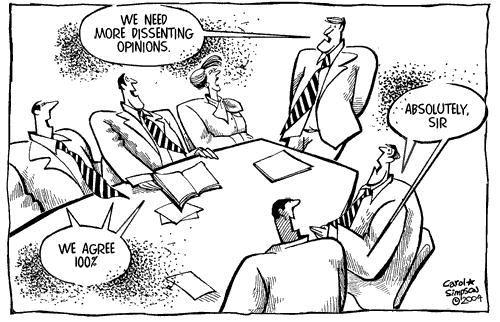Normally I try to post on a topic that isn't highly popular and at least attempt to present both sides to some extent while giving merits to the side I disagree with. This aim isn't difficult as the other side always has a good purpose they are trying to achieve. Well... today's post is a little different. It is more a commentary on student attitudes and work ethic; and honey, it ain't pretty. This commentary extends beyond the DPT curriculum, and is easily applicable to many fields of study, however due to my limited experience with those other programs, I am keeping a narrow focus on PT programs.
Now, let us dissent.
Time and time again I have seen/heard the phrase "this class/teacher is trying to fail me". Speaking from my experiences with the DPT program I came from, this is not the case, and those who allow this kind of thinking to prevail are just as guilty as those voicing it.
Look, I get it. Sometimes classes are hard and its difficult to see the light amid a bunch of brain slices or psychometric measures. I've been in danger of failing before and it's wasn't a picnic. But the moment you begin to lose value in the challenge of your education,
you've already failed. That's right. If you think that big bad test (which, by the way, the majority of graduated students have passed), don't even wait for the failing grade. Go home. Give up.
You obviously no longer value your education so why stick around and whine about it while the rest of your classmates are actually taking the experience
seriously?

The use of this phrase is a deadly cycle in the educational system today. In the advent of social media, what we say has a lot more pull. Its not always white noise...some people do pay attention and will remember what you say, so think about the repercussions before posting your grievances to be immortalized on the internet. (Even I wait about a week after composing a post before publishing it to make sure that the passion behind my ideas are driven by logic and not purely emotion.)
This behavior also perpetuates
serious fear mongering among next years students. The class behind you enters the curriculum with preconceived notions that its the Kobayashi Maru of PT classes, which it obviously isn't as the program you are in has most likely graduated a class or two unless they are in the accreditation process. Now you have just tainted what might have been a rewarding and challenging class for another student by priming them with self-doubt and fear. So now not only are you disrupting your own educational potential, but now you have just ruined the same opportunity for another student. Not exactly a shining moment.
I saw this a lot in other students as our curriculum got harder. It was disheartening to hear these brilliant minds thinking our professors (who slaved over a lesson plan and researched for hours to put together a lecture on the latest and greatest techniques) were just out to get us and didn't care about our performance.
Wrong. If they didn't care, then they would tell us to read the book and be prepared for a test in 16 weeks. They wouldn't answer our questions, they wouldn't ask us to share our experiences, and they certainly wouldn't be willing to meet outside of class.
A DPT-level education isn't easy. You can't coast by in it, nor should you. I am always surprised at how students are stunned that they don't just deliver the answers to us on a silver platter. Um.... This isn't grammar school. Because that isn't a great way to retain information. And who is going to want a PT that just did the bare minimum work and lets others tell them how it should be done? You are much more marketable for yourself and to your patients if you go out and actively seek answers and *
gasp* ask for help when appropriate.
The "Us versus Them" argument is pervasive throughout society. It appears in sports rivalries, world conflict, and now, premiering in a classroom near you!
Your professors are not working against you by challenging you, they are training you to think critically and work hard to find the answer.
They are actually training you in real-world problem solving, because once you graduate, you may need to find answers by yourself on occasion without a teacher to guide you. While exploring your ability to fulfill this task in an environment where you have
mentorship and a moderate level of
protection, they are giving you the best gift they possibly can:
autonomy. And I would consider that a pretty important endowment, seeing as its one of the 4 main principles behind medical ethics. By not babying you and handing you a passing grade, teachers are acting in a completely ethical manner.
Furthermore, challenging the young minds of tomorrow
ensures the future of the field of physical therapy. It raises a generation of problem solvers who can look into complex situations and maintain the velocity in which the APTA is currently traveling. To act in a manner contrary to this would jeopardize our future. I also have a feeling that your professors are challenging everyone equally. It would be silly to only challenge a few students and not the rest, such as giving different tests or excluding some from extra credit opportunities (also illegal).
If it seems like other students are successful with a similar challenge, you might want to investigate how they are approaching the topic. Use them as a resource for your own success; there is no shame in that. They might have insight that you don't.
And yes, I will say that occasionally everyone in the class fails a test. In that case, investigate what happened! Was it a new test that hasn't been given before? Is the professor new and maybe needs some time for acclimation? Both parties can benefit from the self-discovery involved in this situation. Also, purposely trying to fail a specific student or a group of students, is not only unethical, its also illegal. It's also the reason why honor and academic committees are in play. If you feel like this is seriously the case,
then take action; don't just gripe about it on social media. This is a serious allegation and it should be dealt with on a no-tolerance level. And if you're not serious enough about these allegations, then keep your thumbs still. It looks bad on you for complaining and it looks bad on the program/professor.
So do yourself a big favor and look at the situation as an opportunity for professional growth instead of a personal attack. Your education is an investment; take it as such. And remember: YOU applied, YOU interviewed, and YOU volunteered to be here, so why play the victim when the only person responsible for your predicament is you? Take charge and go the extra mile. Schedule an appointment with your professor for extra help. Start a study group. You would be surprised that when you do more than just the bare minimum to pass, you might actually retain something...which comes in handy for boards. Is PT school hard? YES. But is there a way to get through it. YES, multiple, in fact. You just need to think critically, utilize your resources, and optimize the opportunity you have at hand.







